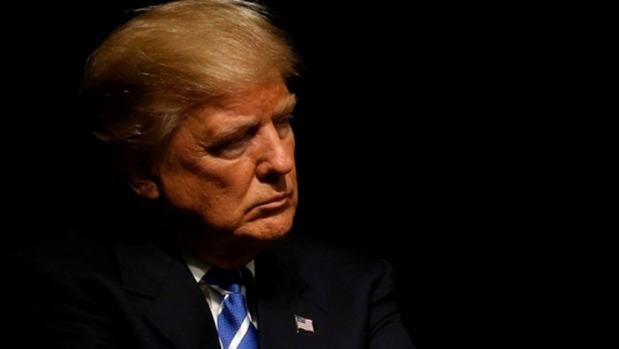The 59 Tomahawk cruise missiles fired last night at a Syrian military air base was the first direct US action against Bashar al-Assad’s regime, the regime that Moscow has protected since 2015. The strike was in retaliation for a chemical attack that killed dozens of civilians on Monday.
Russia, which was swift to secure its military personal as well as assets from Syrian bases after the warning by Washington Thursday, is now condemning the US missile strike against Syrian government forces. In its kneejerk reaction, the Kremlin announced to pulling out of an agreement to minimise the risk of in-flight incidents between American and Russian military aircraft operating over Syria. The move ends working relationship agreed in Syria between Moscow and the Obama White House. It’s the first time since Putin’s aggressive military posturing since the attack on Georgia that Russia has been confronted instead of being appeased.
Finding itself isolated with China apparently siding with America, as the two presidents met and dined in Florida, Russia has sought an immediate meeting of the United Nations Security Council declaring the strike ‘a violation of international law’.
The question really is as to whether international law does or does not allow such unilateral interventions in the wake of most certain committal of war crimes.
The notion of right to protect
When the Assad regime used chemical weapons, for the first time in 2013, UN member-states must have invoked the principle of the responsibility to protect (R to P or R2P). The Responsibility to Protect is a global political commitment, which was endorsed by all member states of the United Nations at the 2005 World Summit to prevent genocide, war crimes, ethnic cleansing and crimes against humanity.
The first premise for R2P is that civilian protection must be a key consideration for nation-states instead of geostrategic or geopolitical interests. Secondly, the United Nations is based on the idea of a global conscious, which should react to injustice and speak effectively through its institutions such as Commission on Human Rights, General Assembly and Security Council. The US president has bridged the difference between concept and reality on the issue of responsibility to protect.
Syrians stood up against the Assad family after four decades of tyranny. With the hope rising from Tunisia, they took to streets unarmed. The regime responded with zero tolerance toward dissent. Within weeks, dozens of dead protestors were being mourned but the urge for self-respect was only increasing. After the protestors were attacked by the armed forces, self-respecting officers and soldiers started refusing such orders, thus creating a robust opposition force later called, the Free Syrian Army. Then began an armed confrontation, eventually turning into a civil war.
There have been various landmark events in Syrian uprising as it transited from protests to civil war and eventually the multilateral diplomacy resulting in disarming Damascus of its Weapons of Mass Destruction, precisely Chemical Weapons’ Convention in 2013.
The stark realities of realpolitik whereby the UN member-states made little or if at all, half-baked attempt to articulate the case of responsibility to protect, have changed. Unlike over-cautious Obama, his successor has made the initial move under the pretext of protecting unarmed civilian against excessive use of force.
Prior last night’s symbolic and limited missile strikes, this crisis highlighted the controversy on whether a state can use force for humanitarian purposes without Security Council authorization, a long-standing international legal question that did not arise in the Darfur, Libya, or Côte d’Ivoire crises.
If the evolution of Syrian crisis is seen from the perspective of R2P, the Thursday night’s airstrike make much sense. So far the policies of key global actors which attempted to intervene in the situation such as the P-5 (the veto-powered UNSC members) and League of Arab States have been diplomatic and thus, highly ineffective.
The Syrian crisis involves multiple, serious problems that undermine the importance of the Responsibility to Protect (R2P) principle in international relations and international law. The use of force to effect regime change in Libya and Côte d’Ivoire also undermined the United Nations (UN) taking effective action in Syria.
Where does it go from here?
The rationale of some UN member States, which considered the Syrian crisis an internal matter, was also questionable especially violence in the country began to creep across the borders into Turkey, Iraq and Lebanon. More than 2.5 million Syrians had fled their homes by the end of 2011, taking refuge in neighbouring countries or within Syria itself. The number has exceeded beyond 5 million today while more than half of the country’s 20 million is displaced. Half a million Syrians have lost their lives while Iran recruiting mercenaries as far as Pakistan and Afghanistan to aid Assad’s fractured military.
Of all the countries in the world, the UK did come very close to exercise on the basis of R2P principle but shied away because of geopolitical considerations and lack of support by key allies such as Obama who avoided confronting Russia militarily. By all means, the US action is not in violation of international as Russia, Iran and Assad would like to propagate.
The international community – which had so far not only failed to prevent mass atrocities in Syria, but has also slackened to take timely action to react effectively – is now faced with the challenge of averting escalating of the conflict. The Pentagon will be responding soon after assessing the success on ground and response of its adversaries. America’s assumed responsibility isn’t over with striking on one military base. While Russia will proceed with diplomatic recourse against the US, Pentagon may take out a few more Syrian assets without causing any collateral damage and staying clear of Russian footprint in the country. Meanwhile, Israel must be observing the activities of Hezbollah, and possibly may strike as it has repeatedly done in the past.
Contrary to lame politics that has characterised the Syrian crisis to date, the likelihood of effective international cooperation on resolving the conflict seems brighter if China assumes the role of a bridge-builder. With President Xi being a guest of his US counterpart, Beijing is ideally suited to fulfil its role of a global player and economic superpower.














